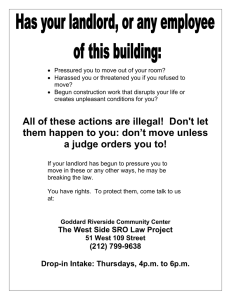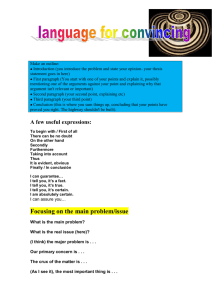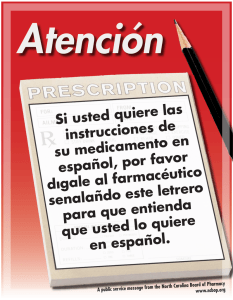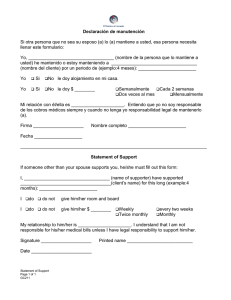You are more than your crimes. You can be a great employee!
Anuncio
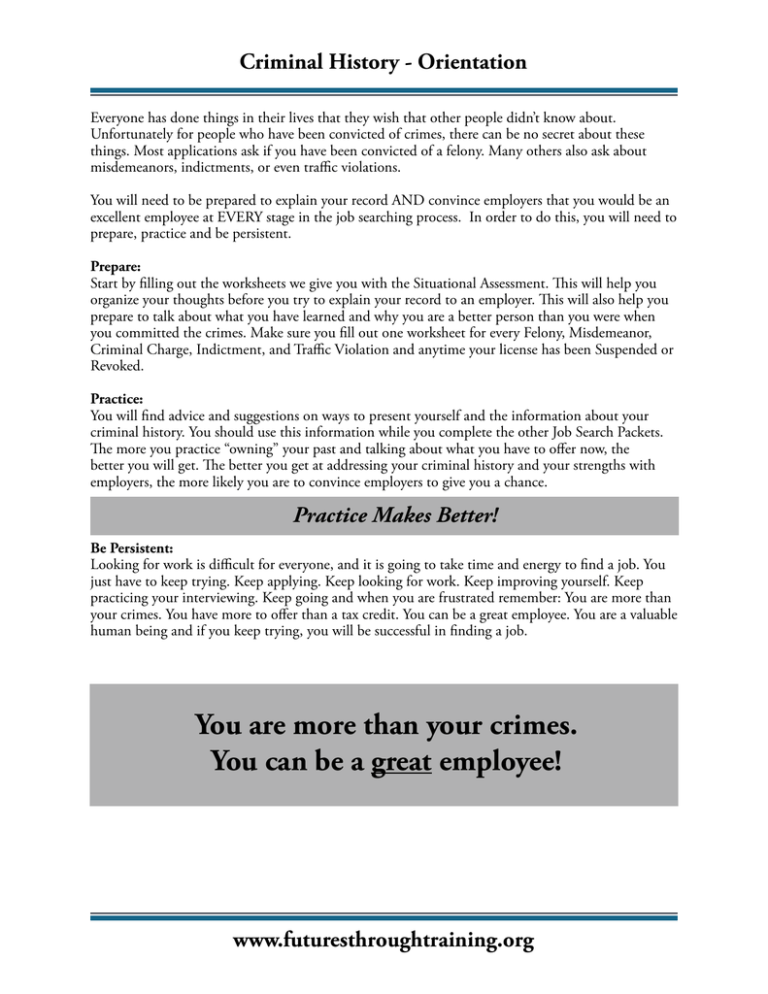
Criminal History - Orientation
Everyone has done things in their lives that they wish that other people didn’t know about.
Unfortunately for people who have been convicted of crimes, there can be no secret about these
things. Most applications ask if you have been convicted of a felony. Many others also ask about
misdemeanors, indictments, or even traffic violations.
You will need to be prepared to explain your record AND convince employers that you would be an
excellent employee at EVERY stage in the job searching process. In order to do this, you will need to
prepare, practice and be persistent.
Prepare:
Start by filling out the worksheets we give you with the Situational Assessment. This will help you
organize your thoughts before you try to explain your record to an employer. This will also help you
prepare to talk about what you have learned and why you are a better person than you were when
you committed the crimes. Make sure you fill out one worksheet for every Felony, Misdemeanor,
Criminal Charge, Indictment, and Traffic Violation and anytime your license has been Suspended or
Revoked.
Practice:
You will find advice and suggestions on ways to present yourself and the information about your
criminal history. You should use this information while you complete the other Job Search Packets.
The more you practice “owning” your past and talking about what you have to offer now, the
better you will get. The better you get at addressing your criminal history and your strengths with
employers, the more likely you are to convince employers to give you a chance.
Practice Makes Better!
Be Persistent:
Looking for work is difficult for everyone, and it is going to take time and energy to find a job. You
just have to keep trying. Keep applying. Keep looking for work. Keep improving yourself. Keep
practicing your interviewing. Keep going and when you are frustrated remember: You are more than
your crimes. You have more to offer than a tax credit. You can be a great employee. You are a valuable
human being and if you keep trying, you will be successful in finding a job.
You are more than your crimes.
You can be a great employee!
www.futuresthroughtraining.org
Antecedentes Penales - Orientación
Todo el mundo ha hecho cosas en sus vidas que ellos deseen que los demás no sepan nada.
Desafortunadamente para las personas que han sido condenadas por delitos, no puede haber ningún
secreto sobre estas cosas. La mayoría de las aplicaciones preguntan si usted ha sido condenado por un
delito grave. Muchos otros también preguntan por delitos menores, acusaciones o incluso violaciones
de tráfico.
Usted tendrá que estar preparado para explicar su expediente y convencer a los empleadores de que
usted sería un excelente empleado en todas las etapas en el proceso de búsqueda de empleo. Con el
fin de hacer esto, usted tendrá que preparar, practicar y ser persistente
Prepare:
Empieza a prepararte para su búsqueda de trabajo llenando los datos de la siguiente hoja de trabajo.
Esto le ayudará a organizar sus pensamientos antes de tratar de explicar su registro a un empleador.
Esto también le ayudará a prepararse para hablar de lo que ha aprendido y por qué usted es mejor
persona de lo que era cuando se cometieron los delitos. Asegúrese de llenar una hoja de trabajo para
cada delito, falta, infracción penal, acusación, y violación de tráfico y en cualquier momento su
licencia ha sido suspendida o revocada.
Práctica:
Encontrarás consejos y sugerencias sobre formas de presentar a sí mismo y la información sobre su
historia criminal. Usted debe utilizar esta información mientras completa el resto de los Paquetes de
Búsqueda de empleo. En cuanto más practiques “poseer” su pasado y hablando de lo que tiene que
ofrecer ahora, mejor lo logrará. Lo mejor que podemos hablar de su historia criminal y sus puntos
fuertes con los empleadores, tanto más probable es para convencer a los empresarios para darle la
oportunidad.
La práctica hace uno mejor.
Sea Persistente:
Buscando trabajo es difícil para todos, y va a tomar tiempo y energía para encontrar un trabajo.
Sólo tienes que seguir intentándolo. Seguir aplicando. Sigue buscando trabajo. Seguir mejorando a
sí mismo. Sigue practicando su entrevista. Sigue adelante y cuando se sienten frustrados recuerde:
Usted es más que sus crímenes. Usted tiene más que ofrecer que un crédito fiscal. Puede ser un gran
empleado. Usted es un humano valioso y si lo sigues intentando, usted tendrá éxito en la búsqueda
de un empleo.
Ud es más que su crímenes.
¡Puede ser un gran empleado!
www.futuresthroughtraining.org
Criminal History Worksheet - Situational Assessment
Criminal History Worksheet
Directions: Answer the following questions to prepare to address your criminal history with employers. Be
honest and complete in all of your answers. This will help you with your Applications, Cover Letters, and in the
Interview.
Use a new worksheet for every Felony, Misdemeanor, Criminal Charge, Indictment, and Traffic Violation and
anytime your license has been Suspended or Revoked.
1. What was the official charge?
2. Was this a felony?
Yes
No
3. What was the date
of conviction?
4. What did you do to deserve this/what was your crime?
www.futuresthroughtraining.org
Criminal History Worksheet - Situational Assessment
5. What did you do to fix what you did?
Examples: Paid restitution; Apologized to victims; Paid back money; Community service; etc.
6. What have you done to change yourself?
Examples: Started AA/NA/GA; Quit drinking/drugs; Took classes; Changed friends;
Counseling; Relocated, etc.
7. What is different about you now?
www.futuresthroughtraining.org
Criminal History Worksheet - Situational Assessment
8. What do you plan on doing to make sure you never do that again?
9. What have you learned through this experience?
10. Is there anything else you want to say about this?
www.futuresthroughtraining.org
Antecedentes Penales Hoja de Trabajo Evaluación de su Situacioń
Antecedentes Penales Hoja de Trabajo
Instrucciones: Responda las siguientes preguntas para prepararse para hacer frente a sus antecedentes penales con
los empleadores. Sea honesto y completo en todas sus respuestas. Esto le ayudará con sus solicitudes, cartas de
presentación, y en la entrevista.
Utilice una nueva hoja de cálculo para cada delito, falta, infracción penal, Acusación, y Violación de tráfico y en
cualquier momento su licencia ha sido suspendida o revocada.
1. ¿Cuál fue el cargo oficial?
Traducción en Inglés:
2. ¿Fue esto un delito grave o una felonía?
Sí
3. ¿Cuál fue la fecha de la condena?
No
4. ¿Qué has hecho para merecer esto / ¿cuál fue su crimen?
Traducción en Inglés:
www.futuresthroughtraining.org
Antecedentes Penales Hoja de Trabajo Evaluación de su Situacioń
5. ¿Qué hiciste para arreglar lo que hiciste
Ejemplos:restitución pagada; Pidió disculpas a las víctimas; A cargo de devolver el dinero; Servicio a la comunidad; etc
Traducción en Inglés:
6. ¿Qué ha hecho usted para cambiarse a sí mismo
Ejemplos:AA Iniciado / NA / GA; Dejar de beber / drogas; Tomó clases; Cambiado amigos; Consejería; Reubicar, etc
Traducción en Inglés:
7. ¿Qué es diferente en Ud. ahora?
Traducción en Inglés:
www.futuresthroughtraining.org
Antecedentes Penales Hoja de Trabajo Evaluación de su Situacioń
8. ¿Qué tienes pensado hacer para asegurarse de que nunca vuelvas a hacer eso?
Traducción en Inglés:
9. ¿Qué has aprendido de esta experiencia?
Traducción en Inglés:
10. ¿Hay algo más que quieras decir sobre esto?
Traducción en Inglés:
www.futuresthroughtraining.org
Criminal Background Application Tips Job Search #1 - Looking For Work
Filling out applications is difficult for most people, and in the case of a person with a criminal
history, it can be extremely challenging.
Almost every application you fill out will ask if you have a felony and many will ask about
misdemeanors or other charges or indictments. Companies that require driving will usually expand
these criminal history questions to include traffic and license violations.
This if you lie, and they find out, then you can lose the job after you got it. If you tell the truth,
many people won’t give you a chance to explain or show that you have changed.
Some things to NEVER do on an application
if you have a felony or other crime on your
record:
•
•
•
•
•
Lie
Write: “I’d rather discuss it in person”
Leave the question blank
Write the offense without explanation
Write the criminal code without explanation
Some things you CAN do are:
• Write a cover letter to every company where
you apply to address the criminal history.
• Turn in reference letters from people who
have seen you change.
• Fill in extra space with what you have done
to try and fix it.
www.futuresthroughtraining.org
Antecedentes Penales - Consejos de Aplicación
Búsqueda de Empleo #1 - Buscando Empleo
Llenar solicitudes es difícil para la mayoría de la gente, y en el caso de una persona con antecedentes
penales, puede ser extremadamente desafiante.
Casi todas las aplicaciones para llenar le preguntará si usted tiene una felonía y muchos le preguntará
acerca de los delitos menores u otros cargos o acusaciones. Empresas que requieren de conducción
por lo general ampliarán estas preguntas de antecedentes penales para incluir violaciones de tráfico y
de licencia.
Si miente y averiguaron, entonces usted puede perder el trabajo después de consiguirlo. Si dices la
verdad, mucha gente le dará la oportunidad de explicar o demostrar que ha cambiado.
Si tienes un delito grave u otro crimen
en su registro, hay algunas cosas que
nunca debe hacer en su aplicación:
•
•
•
•
•
Mentir
Escribir: “Prefiero hablar de ello en persona”
Dejan la pregunta en blanco
Escribir el delito sin explicación
Escribe el código penal, sin explicación
Algunas cosas que usted puede hacer:
• Escribir una carta a todas las empresas
donde se aplica para hacer frente a los
antecedentes penales.
• Entregue cartas de referencia de personas
que lo han visto cambiar.
• Rellene el espacio extra con lo que ha hecho
para tratar de arreglarlo.
www.futuresthroughtraining.org
Criminal Background - Résumés
Remember that a resume is supposed to show
how wonderful you are and not the bad choices
you’ve made.
Your resume needs to reflect your strengths,
your skills and what you can offer an employer.
Here are some things to think about when
making your resume:
• Never list jail/prison/house arrest/parole
time on your resume.
• If you took classes or training during your
incarceration, you can write them without
identifying the “school” if it identifies the
correctional facilities just list the degree or
certificates or classes that you completed, the
date and the state.
• If you had a job while incarcerated, list the
job just as you would any other job and the
facility as your employer.
You are a valuable human being and need to show in
your resume what a great employee you are.
www.futuresthroughtraining.org
Antecedentes Penales - Los Resúmenes
Recuerde que se supone que un resumen es para
mostrar lo maravilloso que eres y no las malas
decisiones que has tomado.
Su resumen debe reflejar sus puntos fuertes,
sus habilidades y lo que puede ofrecer a un
empleador.
Aquí hay algunas cosas en que pensar al hacer su
resumen:
• Nunca lista cárcel / prisión / arresto
domiciliar / tiempo de libertad condicional
en su resumen.
• Si usted tomó clases o entrenamiento
durante su encarcelamiento, se puede
escribir sin la identificación de la “ escuela
“si identifica las instalaciones correccionales
sólo lista el título o certificados o clases que
usted completó, la fecha y el estado.
• Si usted tenía un trabajo en la cárcel, lista
el trabajo tal y como lo haría con cualquier
otro trabajo y la instalación como a su
empleador.
Ud es un humano valioso y necesita mostrar
en su resumen que ud es un gran empleado.
www.futuresthroughtraining.org
Criminal Background - Cover Letters
Whenever you write a cover letter, you have to
make a decision about how you will deal with
your criminal history.
• Will you write about it in the cover letter?
• Will you write a separate explanation letter
to hand the interviewer?
• Will you just talk about it in the interview?
Every job, application and employer is different.
If you look on the internet for advice on
criminal history and job searching, you will find
that even experts have different opinions.
Ultimately, you cannot rely on expert opinions
on this topic. You will have to choose for
yourself what to do. You will need to think
about how to deal with your history and what
you are going to do about it every time you
apply for a job.
Here are some things to consider when making
your decision:
• Is this an employer who will:
• Think I’m lying by not talking about it up
front?
• Not give me a chance without meeting me
after learning about what I have done?
• Read a cover letter or an explanation letter?
• Is there a felony or other criminal history
question on the application?
• Does this company hire felons?
• Does this company do background
screenings?
• Will I be better able to talk about or write
about my criminal history?
• What will give me the best chance at getting
the job?
You will have to choose
for yourself how to deal
with your history
every time you apply
for a job.
www.futuresthroughtraining.org
Criminal Background - Cover Letters
If you decide to talk about this in the cover letter, you could add to your cover letter between the
standard third and fourth paragraphs of the Cover Letter Packet. Review the attached Template for
a Cover Letter addressing criminal history. You will have more information to fit on one page, but
some things you can do to write all you need to cover and still keep it to one page:
• Reset all page margins to: 1 inch or .75 inches
• Reset the font size to 11 point
• Remove the {Enter}s between the paragraphs (as shown)
• Remove 1 {Enter} between the Date and Company Name (as shown)
• Remove 1 or 2 {Enter}s between Sincerely and Your Name (as shown)
www.futuresthroughtraining.org
Criminal Background - Cover Letters
{Indent} Date
{Enter}
Company Name
Address
City, State Zip Code
{Enter}
Dear [Name of Person Doing Hiring],
{Indent}I am writing to apply for the [Job Title Exactly as It is Written in the Listing] job that I learned
about through [Where Job Listing Came From; Or Where You Heard About The Job]. I am very
interested in this job.
{Indent}Your company is known for [Accomplishments, Things Company is Proud of – If the company
has a website, you can find out more about them there].I am impressed because [List 2 or 3 Things You
Like About the Company]. [Company’s Full Name] is a good company and I would really like to be a
part of the team.
{Indent}I would be great choice for this job because I have [Number] years experience [List Job Title if
You Have Experience in this Job, OR If You Have Experience Doing Things That Would Be Helpful in
This Job, List Those Tasks/Activities]. I can [List the Qualities and Abilities From the Job Listing That
You Can Do.] I can learn how to [Things From the Job Listing That You Can’t Do Now But Can Learn].
I [List Any Credentials or Training Required in the Listing] Additionally, I am [List Other Qualities
About Yourself That Would Make You More Impressive. Examples: Bilingual, Willing to Work Overtime
and Weekends, etc. If you have a criminal history, you will need to list about twice as many as someone
applying without a criminal history]
{Indent}I do have a criminal history that I am ashamed of, but I am now [use answer from question #7
on worksheet - write about what is different about you]. I have also taken steps to make sure I never
make the same mistakes again. Some of those things are [use answer from question #8 on worksheet –
write about what you are doing to make sure it never happens again]. [Number of years ago you were
convicted] years ago, I was convicted of [use answer from question #1 on worksheet – write the official
charge] because I [use answer from question #4 on worksheet – write about your crime]. I know I can’t
change the past, but I have done my best to make up for what I have done. I have [use answer from
question #5 on worksheet – write about what you did to make up to the victims]. I have also [use answer
from question #6 on worksheet – write about what you have done to improve yourself ]. I have learned
[use answer from question #9 on worksheet – write about what you have learned] and I will never do
that again. I have made mistakes in my past, but I have learned from them. If you will give me the
chance to prove myself to you, you will see that I have a lot to offer. I hope that you can see past my past
and give me a chance to show you that I can be a great employee for your company. Please refer to my
attached resume for more information on what I can offer your company.
{Indent}Please call me at [Phone Number] to schedule an interview.
{Enter}
{Indent} Sincerely,
{Enter}
{Enter} Your Signature
{Enter}
{Indent} Your Name
www.futuresthroughtraining.org
Antecedentes Penales - Cartas de Presentación
Siempre que escriba una carta de presentación,
usted tiene que tomar una decisión sobre cómo
va a lidiar con sus antecedentes penales.
• ¿Va a escribir sobre ello en la carta presentación?
• ¿Va a escribir una carta de explicación
separada para entregarla al entrevistador?
• ¿Va a hablar de eso en la entrevista?
Cada trabajo, la aplicación y el empleador es
diferente.
Si nos fijamos en el Internet para obtener
asesoramiento sobre la historia criminal y la
búsqueda de empleo, usted encontrará que
incluso expertos tienen diferentes opiniones.
Al final, no se puede confiar en las opiniones de
expertos sobre este tema. Usted tendrá que elegir
por si mismo lo que debe hacer. Usted tendrá
que pensar en cómo hacer frente a su historia y
lo que va hacer al respecto cada vez que usted
solicita un trabajo.
Aquí hay algunas cosas a tener en cuenta al
tomar su decisión:
• ¿Es este un empleador que:
• ¿Pensaría que estoy mintiendo por no hablar
de ello por adelantado?
• ¿No me darán una oportunidad sin
conocerme después de enterarse de lo que he
hecho?
• ¿Leerá una carta de presentación o una carta
de explicación?
• ¿Existe un delito grave u otro problema de
antecedentes penales en la solicitud?
• ¿Esta empresa contrata delincuentes?
• ¿Hace esta empresa hacer revisión de
antecedentes?
• ¿Voy a poder mejor de hablar o escribir
acerca de mis antecedentes penales?
• ¿Qué me dará la mejor oportunidad de
conseguir el trabajo?
Usted tendrá que elegir
por sí mismo cómo hacer
frente a su historia cada vez
que se solicita
un trabajo.
www.futuresthroughtraining.org
Antecedentes Penales - Cartas de Presentación
Si decides hablar de esto en la carta de presentación, se podría añadir a su carta de presentación entre
los párrafos estándar tercera y cuarta de la Carta de Presentación. Revise la plantilla adjunta de una
carta de presentación frente a los antecedentes penales. Usted tendrá más información para caber
en una página, pero hay algunas cosas que usted puede hacer para escribir todo lo que necesita para
cubrir y aún así mantenerlo en a una página:
• Reajustar todos los márgenes de la página a: 1 pulgada o 0,75 pulgadas
• Restablecer el tamaño de tipo de letra a 11 puntos
• Eliminar los {Enter}s entre los párrafos
• Eliminar 1 {Enter} entre la fecha y el nombre de la empresa
• Remove 1 or 2 {Enter}s between “Sincerely” and “Su Nombre”
www.futuresthroughtraining.org
Antecedentes Penales - Cartas de Presentación
{Endentar} Fecha
{Enter}
Nombre de la Empresa
Dirección
Ciudad, Estado Código Postal
{Enter}
Dear [Nombre de la persona que realiza la contratación],
{Endentar}I am writing to apply for the [Título del trabajo exactamente como está escrito en la lista]
job that I learned about through [Donde la oferta de empleo provino de; O donde usted se enteró del
trabajo]. I am very interested in this job.
{Indent}Your company is known for [Logros, cosas que la empresa se enorgullece - Si la empresa
tiene un sitio web, usted puede encontrar más información acerca de ellos allí]. I am impressed
because [Lista 2 o 3 cosas que te gustan de la compañía]. [Nombre de la empresa completo] is a good
company and I would really like to be a part of the team.
{Endentar}I would be great choice for this job because I have [número] years experience [Lista de
títulos de empleo Si usted tiene experiencia en este trabajo, o si usted tiene experiencia de hacer
cosas que serían de gran ayuda en este trabajo, una lista de las tareas /actividades]. I can [Todos las
cualidades y habilidades de la lista de empleo que usted puede hacer]. I can learn how to [las cosas
de la lista de trabajo que no se puede hacer ahora, pero puede aprender]. I [Lista los credenciales o
formación exigida en el Listado] Additionally, I am [Todos Otras Calidades de ti mismo que te hacen
más impresionante. Ejemplos: Bilingüe, Dispuesto horas extras y fines de semana, etc Trabajo Si usted
tiene un historial criminal, tendrá que listar aproximadamente dos veces más que alguien que solicita y
sin antecedentes penales]
{Endentar}I do have a criminal history that I am ashamed of, but I am now [el uso de respuesta de
la pregunta # 7 en la hoja de trabajo - escribe sobre lo que es diferente acerca de usted]. I have also
taken steps to make sure I never make the same mistakes again. Some of those things are [Respuesta
uso de la pregunta # 8 en la hoja de trabajo - escribe sobre lo que está haciendo para asegurarse de que
no vuelva a suceder]. [Número de años que fue condenado] years ago, I was convicted of [use answer
from question #1 on worksheet – write the official charge] because I [Use la respuesta de la pregunta
# 4 en la hoja de trabajo - escribe acerca de su delito]. I know I can’t change the past, but I have done
my best to make up for what I have done. I have [Respuesta use la pregunta # 5 en la hoja de trabajo
- escribe acerca de lo que hiciste a compensar a las víctimas]. I have also [Respuesta use de la pregunta
# 6 en la hoja de trabajo - escribe sobre lo que ha hecho para mejorar el mismo]. I have learned [use la
respuesta de la pregunta # 9 en la hoja de trabajo - escribe sobre lo que ha aprendido] and I will never
do that again. I have made mistakes in my past, but I have learned from them. If you will give me the
chance to prove myself to you, you will see that I have a lot to offer. I hope that you can see past my
past and give me a chance to show you that I can be a great employee for your company. Please refer
to my attached resume for more information on what I can offer your company.
{Endentar}Please call me at [número de teléfono] to schedule an interview.
{Enter}
{Endentar} Sincerely,
{Enter}
{Enter} Su Firma
{Enter}
{Endentar}Su Nombre
www.futuresthroughtraining.org
Criminal Background Job Search #2 - The Interview
When you are interviewing for a job, you will
need to be prepared to answer questions about
your criminal history.
Here are some examples of questions you may
hear:
• Tell me about your felony (or misdemeanor,
or criminal history, etc).
• What crimes have you committed?
• Have you ever had your license revoked
or suspended?
• What was your offence?
• Why do you have a criminal history?
• Are you a repeat offender?
Here is a 5-step answer to practice:
Step 1: Say what your crime was
(This can either be worksheet
question #1 or #3)
Step 2: Say what you did to make it better
(choose 3 to 5 things from worksheet
questions number #4 & #5)
Step 3: Say what you’ve learned OR
how you are different now.
(This can either be worksheet
question #9 or #6)
Step 4: Explain why the employer
doesn’t need to worry about hiring you.
Step 5: Explain why you would be
a great employee.
If you have multiple offenses, you can talk about
each one separately, or summarize all crimes
into one answer. Either way, you will need to
practice.
Practice answering questions while doing Mock
Interviews from the Job Search Packet #2 – The
Interview. You can also practice in front of a
mirror, with friends, relatives or case workers.
www.futuresthroughtraining.org
Antecedentes Penales Búsqueda de Empleo # 2 - La Entrevista
Cuando usted está entrevistando para un
trabajo, usted tendrá que estar preparado
para responder a preguntas sobre su historial
criminal.
Estos son algunos ejemplos de preguntas que
usted puede escuchar:
• Hábleme de su delito mayor (o menor, o
de antecedentes penales, etc.).
• ¿Qué crímenes han cometido?
• ¿Ha tenido su licencia revocada
o suspendida?
• ¿Cuál fue su delito?
• ¿Por qué usted tiene un historial criminal?
• ¿Es usted un reincidente?
He aquí una respuesta de 5 pasos a la práctica:
Paso 1: Diga cuál fue su crimen
(Esto puede ser la hoja de trabajo
la pregunta # 1 o # 3)
Paso 2: Di lo que hiciste para que sea mejor
(Elija 3 a 5 cosas de preguntas hoja
número # 4 y # 5)
Paso 3: Di lo que ha aprendido o
cómo usted es diferente ahora.
(Esto puede ser la hoja de trabajo
la pregunta # 9 o # 6)
Paso 4: Explique por qué el empleador
no tiene que preocuparse de contratarlo.
Paso 5: Explique por qué usted sería
un gran empleado.
Si dispone de varios delitos, se puede hablar
de cada uno por separado, o resumir todos
los delitos en una sola respuesta. De cualquier
manera, usted tendrá que practicar.
Practique responder preguntas mientras se
hace Entrevistas Simuladas de la Búsqueda de
Empleo Paquete # 2 - La Entrevista. También
puede practicar frente a un espejo, con amigos,
familiares o trabajadores sociales.
www.futuresthroughtraining.org
Criminal Background Job Search #3 - Starting A Job
When you get a job, be prepared to prove yourself. Review the Job Search Packet #3 – Starting a
Job. You will need to:
•
•
•
•
•
•
•
•
•
•
•
Work harder, faster, and better than the other people around you to prove to your boss that
you are worth gambling on.
Make sure you avoid any conflict at work – your boss may treat you more harshly than other
employees who don’t have a criminal history. So, stay away from people who get in arguments
or fights.
Do not even listen to people who are talking about arguments because the boss may assume
you are the one starting the problems.
Don’t talk about your crimes in normal conversation – some people will think you are gloating.
They may assume that you think it is fun, “cool” or acceptable to commit crimes and they
may suspect you of things you haven’t done.
If a co-worker asks you directly if you have a criminal history, either:
• Say, “I prefer not to talk about personal matters at work.” OR
• Use the 5-step answer from your interview.
If your boss asks you directly about your crimes, do not be defensive. Look him/her straight
in the eye and use the 5-step answer from your interview.
Be sure to be working whenever anyone looks.
Avoid sneaky behaviors.
Always be where you are supposed to be.
On breaks, only spend time with the “good” workers because you will be judged by
the people you are with.
There may come a time when you are accused of something – STAY CALM. Do not get
defensive and try to be as helpful as possible. Remember that everyone gets accused of things
they didn’t do, and as long as you have nothing to hide, everything will work out okay. Just
keep being a great worker and don’t give up.
www.futuresthroughtraining.org
Antecedentes Penales Búsqueda de Empleo # 3 - Comenzando un Empleo
Cuando usted consigue un trabajo, estar preparado para demostrar lo que vales. Usted necesitará:
•
•
•
•
•
•
•
•
•
•
•
Trabajar más duro, más rápido y mejor que las otras personas a tu alrededor que demostrar
a su jefe que ustedes valen las apuestas en.
Asegúrese de evitar cualquier conflicto en el trabajo - su jefe puede tratarle con más dureza
que otros empleados que no tienen antecedentes penales. Por lo tanto, se mantenga alejado
de las personas que se meten en argumentos o peleas.
Ni siquiera escuchar a las personas que están hablando de argumentos, ya que el jefe
puede asumir usted es el titular de los problemas.
No hable de sus crímenes en una conversación normal - algunas personas pensarán
que usted está regodeo. Ellos pueden asumir que usted piensa que es divertido, “cool”
o aceptable para cometer delitos y que Puede usted sospecha de las cosas que no has hecho.
Si un compañero de trabajo le pregunta directamente si usted tiene un historial criminal, ya sea:
• Diga: “Yo prefiero no hablar de asuntos personales en el trabajo.” OR
• Use la respuesta de 5 pasos de su entrevista.
Si su jefe le pregunta directamente acerca de sus crímenes, no estar a la defensiva.
Busque él / ella directamente a los ojos y utilizar la respuesta de 5 pasos de su entrevista.
Asegúrese de estar trabajando cada vez que alguien ve.
Evitar comportamientos elusivos.
Siempre en el que se supone que deben ser.
En los descansos, sólo pasar el tiempo con los trabajadores “buenos,” ya que será juzgado
por las personas que están con.
Es posible que llegue un momento en el que se le acusa de algo - CALMA. No te pongas
defensiva y tratar de ser lo más útil posible. Recuerde que todo el mundo se le acusa
de cosas que no hicieron, y cuando no tienes nada que ocultar, todo saldrá bien.
Sólo seguir siendo un gran trabajador y no te rindas.
www.futuresthroughtraining.org
Criminal History Questions - Mock Interview
Questions;
Choose 1:
Tell me about your felony (or misdemeanor, or criminal history, etc).
What crimes have you committed?
Have you ever had your license revoked or suspended?
What was your offence?
Why do you have a criminal history?
Are you a repeat offender?
Step 1:Say what your crime was (This can either be worksheet question #1 or #3)
Step 2:Say what you did to make it better
(choose 3 to 5 things from worksheet questions number #4 & #5)
Step 3:Say what you’ve learned OR how you are different now.
(This can either be worksheet question #9 or #6)
Step 4:Explain why the employer doesn’t need to worry about hiring you.
Step 5:Explain why you would be a great employee.
www.futuresthroughtraining.org
Criminal History Questions - Mock Interview
Preguntas;
Elija 1:
Hábleme de su delito (o falta, o la historia criminal, etc).
¿Qué crímenes ha cometido usted?
¿Alguna vez ha tenido su licencia revocada o suspendida?
¿Cuál fue su delito?
¿Por qué tiene antecedentes penales?
¿Es usted un reincidente?
Paso 1:Diga cuál fue su delito
(Esto puede ser la hoja de trabajo la pregunta # 1 o # 3)
Paso 2:Diga lo que hizo para mejorar
(elige 3 a 5 cosas de preguntas hoja número # 4 y # 5)
Paso 3:Diga lo que ha aprendido o cómo es diferente ahora.
(Esto puede ser la hoja de trabajo la pregunta # 9 o # 6)
Paso 4:Explique por qué el empleador no tiene que preocuparse de contratarlo.
Paso 5:Explique por qué usted sería un gran empleado.
“This workforce product was funded by a grant awarded by the U.S. Department of Labor’s Employment and Training
Administration. The product was created by the grantee and does not necessarily reflect the official position of the U.S. Department
of Labor. The U.S. Department of Labor makes no guarantees, warranties, or assurances of any kind, express or implied, with
respect to such information, including any information on linked sites and including, but not limited to, accuracy of the information
or its completeness, timeliness, usefulness, adequacy, continued availability, or ownership. This product is copyrighted by the
institution that created it. Internal use by an organization and/or personal use by an individual for noncommercial purposes is
permissible. All other uses require the prior authorization of the copyright owner.”
www.futuresthroughtraining.org


